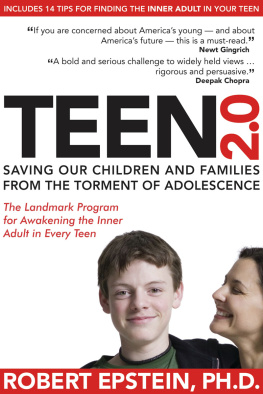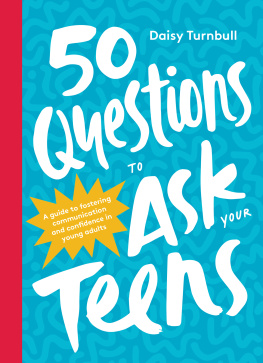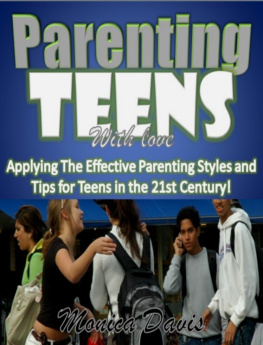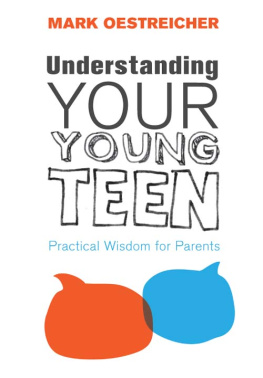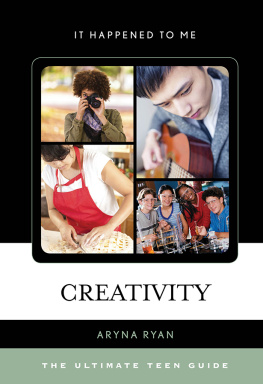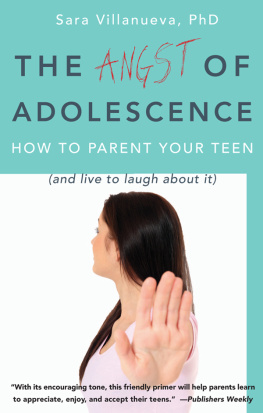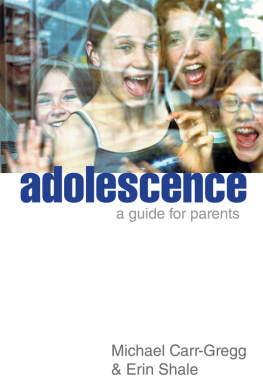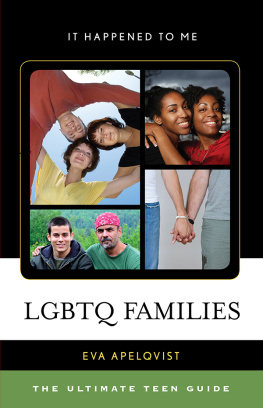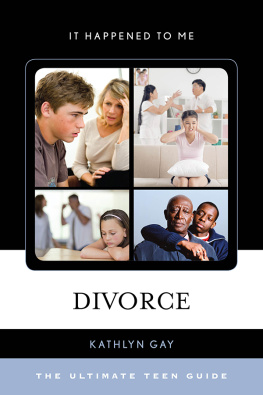Praise for the Previous Edition of this Book
The Case Against Adolescence: Rediscovering the Adult in Every Teen
Winner of the San Diego Book Award and the Lysander Spooner Award for Advancing the Literature of Liberty
one of the most revolutionary books I have ever read.
Albert Ellis, Ph.D., The Albert Ellis Institute (from the Foreword)
Adolescence was invented in the nineteenth century to enable middle-class families to keep their children out of sweatshops. But it has degenerated into a process of enforced boredom and age segregation that has produced one of the most destructive social arrangements in human history, consigning thirteen-year-old males to learning from fifteen-year-old males. Its a social experiment that failed. Dr. Epsteins book traces the history of the problem, demonstrates with unrelenting perseverance that much of the turmoil of our teens is a creation of our culture, and offers a specific and detailed proposal for getting our young people back on track. If you are concerned about Americas youngand about Americas futurethis is a must-read.
Newt Gingrich, former Speaker of the United States House of Representatives and Founder of the Center for Health Transformation
Perhaps it is time for a paradigm shift in how we understand the tumultuous time we call adolescence. Dr. Epsteins landmark book may be just what we need to help enhance our understanding of and better serve those moving through this complex period of life.
Drew Pinsky, M.D., Host of Loveline and Celebrity Rehab with Dr. Drew; Medical Director, Department of Chemical Dependency Services, Las Encinas Hospital
Epsteins book presents a serious and bold challenge to widely held views about teenagers: that they are inherently irresponsible, that they must be shielded from adult challenges, that they are not capable of making sound decisions about matters of health. Epstein demonstrates in a rigorous and persuasive way that teens are in fact highly capablein some respects even more capable than adults. By shielding and protecting young people from adulthood, we have isolated them from their elders, from their spiritual roots, and from their heritage, leaving many of them angry and confused in the spiritually empty world of teen culture. We need to reexamine our basic assumptions about young people, and Epstein shows us how.
Deepak Chopra, author of Life After Death: The Burden of Proof
Many developmental scientists, psychotherapists and popular writers have tackled the problem of adolescence, but none with the objective clarity and perspicacity of Dr. Robert Epstein. He argues persuasively that adolescence is an unnecessary creation of modern culture and gives both parents and professionals new insights about worrisome aspects of the behavior we see so often during the teen years. Epsteins arguments are well researched and empirically defensible, and he is a lucid writer. At times his prose is riveting.
Lewis P. Lipsitt, Ph.D., Emeritus Professor of Psychology, Medical Science and Human Development, Brown University
This is a profoundly important book. Dr. Epstein is raising issues about our young people that we need to think about and evaluate carefully. Generally, I think the institutions that serve our young are sound, but this book points to some obvious problems-most especially the fact that our young people are largely isolated from the adult world. If you care about Americas young, this is a must-read.
Dr. Joyce Brothers, author & columnist
Dr. Epstein is correct in expressing skepticism about all the hype these days on the teen brain. There is no evidence that the problems of American teens are a result of immature brains. My own research suggests that what many adults call risky behavior in teens may actually be associated with brain maturity. Dr. Epstein writes with unusual clarity on the teen-brain issue. Given whats at stake for our society, his views need to be taken seriously.
Gregory S. Berns, M.D., Ph.D, Distinguished Chair of Neuroeconomics and Director of the Center for Neuropolicy, Emory University
I believe what Dr. Epstein is saying one hundred percent. Young people have the ability to do great things; they just never have the opportunity to do them. Theyre also rarely placed in situations where they have to do them. We treat teens as if theyre just kids, assuming they cant do very much, but when theyre put into tough situations, they tend to perform just as well or even better than adults. As a teen I successfully impersonated an airline pilot, a medical doctor, a lawyer, and a college instructor. Imagine what I could have done if I had actually been encouraged to develop my adult capabilities. And imagine what todays teens might be able to do if they werent so completely cut off from the adult world.
Frank W. Abagnale, author of Catch Me If You Can; president, Abagnale & Associates
The American education system, as we know it, was designed during a period of rapid industrialization. The mission of schools was to inculcate industrial discipline as a means of preparing our young people, in factory-like fashion, to work in the new industrial world. That antiquated system no longer prepares our young for the real world they will be facing in the years to come, and, as Dr. Epstein shows, it also isolates young people from adults in ways that have unfortunate consequences. If you care about the future of our young people, The Case Against Adolescence is an essential read.
Alvin Toffler, author of Future Shock and Revolutionary Wealth
Here are Americas youth, regarded keenly, knowingly-with many popular assumptions and notions set aside in favor of an accurate and thoughtful portrayal of our young fellow citizens, and too, many of the rest of us, who may fail them by overlooking their achievements and possibilities.
Robert Coles, M.D., professor of psychiatry, Harvard University; recipient, Pulitzer Prize
Robert Epsteins critique of our conventional view of adolescence is timely. Of all its wide implications, perhaps the most significant is the one for education. Treating young people as adults and giving them the opportunity to embrace responsibility are strategies that the empirical research and analysis of Epsteins work justify. This is a vital book for parents and policy makers on the state and federal levels. It is a long overdue contribution.
Leon Botstein, president, Bard College; author of Jeffersons Children: Education and the Promise of American Culture
Dr. Epstein has written a very provocative essay about adolescence. His arguments deserve serious consideration and open debate.
Ellen Langer, Ph.D., author of Mindfulness; Professor of Psychology, Harvard University
Epsteins book on adolescence is a fresh and timely look at what makes teens miserable, and how their condition can be helped. It is a very original approach, sure to ignite discussion and controversy. A great deal of what he says is right on the money, and few people have written on this subject with his combination of expert knowledge and clear prose.
Mihaly Csikszentmihalyi, author of Flow; Professor of Management, Clairemont Graduate Center
Teenagers are not children. Dr. Epstein convincingly demonstrates the harm caused by treating them that way. With an intellectual honesty not often seen, this book cuts through the mountain of prejudice and negative stereotypes and shows teens as they once were, and some day will be again. This is an important book, and one that strikes the next nail in the coffin of the bigoted storm and stress view of adolescence. This book should be required reading for all youth workers, all parents trying to better understand their kids, all politicians setting youth policy, and most especially for teens who instinctively recognize the injustice and harm of our system. This book is a powerful tool for articulating that injustice.

